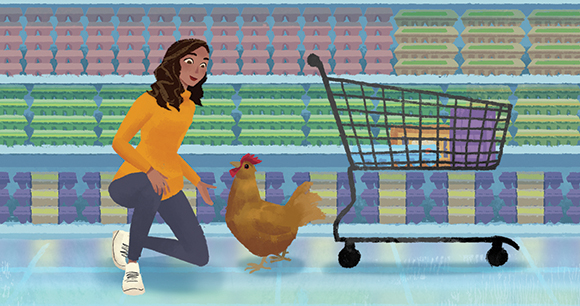Eggs are a staple of the Western diet. In the United States, 94 percent of Americans report consuming them, and annual egg consumption averages around 280 per person. In 2022, around 109.5 billion eggs were produced in the United States.
With animal products, mass production typically comes with a massive price—not to the consumer, but to the animals involved. Animals are packed into quarters so tight they can scarcely move, let alone express the natural behaviors that might alleviate the stress of their confinement. In this respect, the egg industry has traditionally been no different—keeping hens in “battery cages” so small and crowded that the hens cannot even spread their wings. There is a growing public concern, however, over the welfare of animals raised for food—with calls for reform and, in some states, laws to mandate such reforms. In recent years, the welfare of egg-laying hens has drawn particular scrutiny, leading to a significant increase in the proportion of hens being housed outside battery cages. According to the US Department of Agriculture, as of September 2023, approximately 32 percent of US laying hens were housed in cage-free systems.

Public interest in this issue has also led producers to attach a variety of claims to egg carton labels, seeking to convince consumers that the hens pressed into service are experiencing a happy life—free from cages and free to roam.
The average shopper, however, is unlikely to know the particulars of these animal-raising claims—how they differ from one another and how they actually impact animal welfare. Consumers who understand the terminology and trustworthiness of the claims, of course, can make more informed choices.
To help engage and educate consumers, AWI partnered with The Garden Creative, a production company, to develop a three-minute animated Choose Better Eggs video depicting how hens are raised under the four main hen housing systems: caged, cage-free, free-range, and pasture-raised. Shortened versions of the video are running on various social media platforms. This four-month campaign is aimed at shoppers in five US metropolitan areas: Austin, Boston, Chicago, Denver, and Seattle.
Our targeted audience groups are bakers, vegetarians, and those with an identified interest in organic and sustainable living. The video has already garnered attention and admiration from a key preliminary audience: communication and marketing professionals. In November, Choose Better Eggs received a Gold Award at the 2023 MUSE Creative Awards, which recognize “excellence and innovation in the realms of creative design, advertising, and digital media.”
To accompany our social media campaign, AWI has created a Choose Better Eggs website that answers common questions about hen housing and egg labels, such as:
How much space do cage-free, free-range, and pasture-raised hens receive?
The amount of space given to hens raised under different housing systems is determined by the individual egg company or egg certification program. There are no federal laws addressing minimum space allowances for hens; however, several states have set legal standards. The amount of space provided to hens varies greatly, but in general, cage-free hens have slightly more space than caged hens, while free-range hens have more space than cage-free hens, and pasture-raised hens have the most.
Who inspects egg farms to check whether label claims on egg cartons are accurate?
The USDA conducts annual on-farm inspections to verify claims made by producers participating in its egg-grading program, which covers about 55 percent of the eggs sold in the United States. However, the USDA’s low standards for determining compliance do not adequately address animal welfare. Fortunately, many egg producers participate in third-party certification programs that specifically address animal welfare.
Is it important for eggs to be labeled “hormone free”? What about “antibiotic free”?
“No hormones” claims on eggs are a meaningless marketing ploy, since the USDA prohibits the use of hormones in the production of eggs. Claims related to antibiotic use do have some relevance to animal welfare. However, research suggests that, when living in conventional factory farms, animals not administered antibiotics for any purpose may be more likely to experience disease conditions that cause pain and suffering. “No antibiotic” claims are only recommended when the label also contains a higher-welfare claim, such as “pasture-raised.”
What does it mean if an egg carton doesn’t say “cage-free,” “free-range,” or “pasture-raised”?
If an egg carton label doesn’t include any of these claims, then it is very likely the hens were housed in small cages.
How can I tell if a carton of eggs is certified for animal welfare?
Cartons of certified eggs typically contain the word “certified” and/or a certification logo or seal.
Are “USDA Organic Certified” eggs cage-free, free-range, or pasture-raised?
Caged housing is prohibited under the USDA Certified Organic program, but genuine outdoor access is currently not required (and under the recently published updates to organic regulations, won’t be required for all USDA Certified Organic producers until 2029). Consequently, eggs labeled as “organic” may come from hens raised cage-free, free-range, or on pasture. When buying organic eggs, it is necessary to look for these additional claims to determine how the hens were housed.
Which egg brands are certified pasture-raised?
At least four third-party programs currently certify pasture-raised eggs: American Humane Certified, Certified Animal Welfare Approved, Certified Humane, and Regenerative Organic Certified. All these programs list participating producers on their website.
Where can I find certified pasture-raised eggs?
Certified pasture-raised eggs are now available in most major chain grocery stores and online. To locate these products, see the “Finding Certified Pasture-Raised Eggs and Plant-Based Egg Alternatives” section of AWI’s Choose Better Eggs website.
What if I don’t want to purchase or consume any eggs produced by animals?
Plant-based alternatives (including egg replacers, egg scrambles, and hard-boiled eggs) are now available in some stores and online. To locate these products, visit AWI’s Choose Better Eggs website. In addition, recipes can be found on the internet that guide consumers in preparing their own low-cost, plant-based egg substitutes.
Watch the Choose Better Eggs animated video, learn more, and locate better choices near you at ChooseBetterEggs.com.